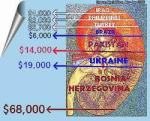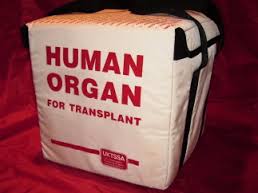 The need for human organs is rapidly expanding throughout the world. That’s created an increasingly critical shortage in body parts and a flourishing black market in the trafficking of human organs.
The need for human organs is rapidly expanding throughout the world. That’s created an increasingly critical shortage in body parts and a flourishing black market in the trafficking of human organs.
Advances in medical knowledge and technology, combined with an increasing and ageing population, has led to a situation where the demand for organs far outweighs the supply.
I’m familiar with organ harvesting and transplanting from my time as a coroner.
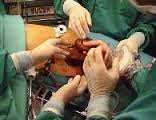 Legal transplants can only be done when the donor is declared brain dead, yet kept ‘alive’ by artificial means. There’s only a short window of time available in removing the donor’s organs and re-installing them in the recipients. This requires coordinating the donor’s family with the cessation of life, assembling the medical harvesting team and the transplanting team, and also ensuring that the suitable recipients are prepared.
Legal transplants can only be done when the donor is declared brain dead, yet kept ‘alive’ by artificial means. There’s only a short window of time available in removing the donor’s organs and re-installing them in the recipients. This requires coordinating the donor’s family with the cessation of life, assembling the medical harvesting team and the transplanting team, and also ensuring that the suitable recipients are prepared.
There are a dozen different human organs that can be transplanted; hearts, lungs, livers, pancreas, eye tissue, bone marrow, bowels, tendons, ligaments, veins, skin, and the most common of all – kidneys.
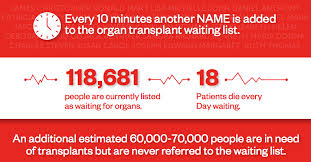 The demand for organs dominates the supply by about ten to one. In North America (United States, Mexico, and Canada) there are nearly 200,000 people needing organ transplants. Around the world it’s in the millions. Less than one percent of deaths result in suitable donor conditions, however one suitable donor can save many lives.
The demand for organs dominates the supply by about ten to one. In North America (United States, Mexico, and Canada) there are nearly 200,000 people needing organ transplants. Around the world it’s in the millions. Less than one percent of deaths result in suitable donor conditions, however one suitable donor can save many lives.
It’s recorded that over eighty-five percent of people support the principle of organ transplants, yet less than fifteen percent are registered donors. Compounding the shortage is that fewer people are dying of conditions that lead to a healthy body suffering brain death.
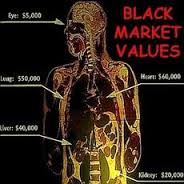 The cost associated to keeping people alive while waiting transplants is enormous, just as the cost of performing and supporting a transplant is enormous. The organ transplant business is huge with many cases racking up hundreds of thousands of dollars.
The cost associated to keeping people alive while waiting transplants is enormous, just as the cost of performing and supporting a transplant is enormous. The organ transplant business is huge with many cases racking up hundreds of thousands of dollars.
Desperate people do desperate things. Where there’s a way to profit – and where there’s a way to stay alive – there’ll always be people who will capitalize regardless of the legal, moral, or ethical attachments. This has created a huge underground industry in the black market trafficking in human organs.
My next novel, No Life Without Death, deals with the criminal trafficking in human organs. During research for the book, I was shocked to discover just how prolific this industry is and how much money is involved.

